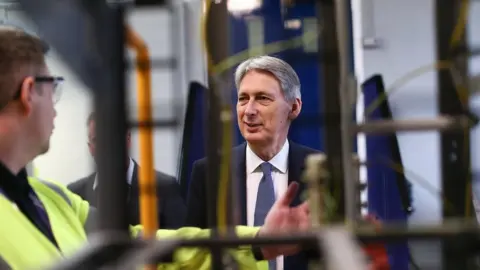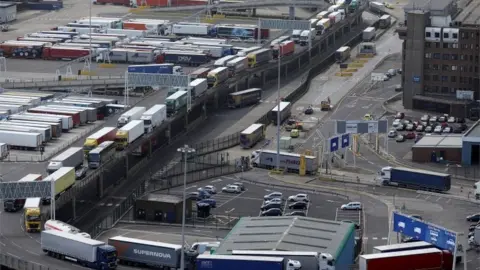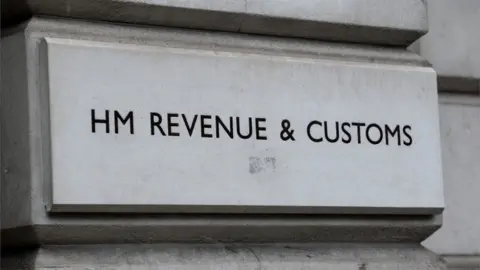Philip Hammond favours EU 'customs partnership'
 Getty Images
Getty ImagesWednesday sees the next stage in the difficult process of the government agreeing its approach to trade with the European Union.
Theresa May will host a meeting of her Brexit cabinet - the inner sanctum that attempts to thrash out the knottiest issues left on the table.
One is the future customs relationship between the UK and EU.
That will be a vital part of any future trade deal as the UK exports 50% of its goods to the EU.
The government has said it wants to leave the EU single market and the customs union and at the same time retain an open border between Northern Ireland and the Republic.
EU rules
The big and highly complicated question is how?
I am told that the chancellor will use the meeting tomorrow to argue in favour of a close "customs partnership" with the EU, or at least not rule it out at this early stage.
Senior sources have told me that Philip Hammond sees advantages in the proposal that would mean the UK could set its own tariffs but would also be obliged to mirror European Union customs rules.
He is likely to receive support from the business secretary, Greg Clark.
 Getty Images
Getty ImagesThe arrangement would mean the UK collecting tariffs on behalf of the EU for any goods coming to the UK that were subsequently destined for any other union member state.
Businesses would claim back any tariff rebates from the government if the goods stayed in the UK.
Although technically difficult - some say impossible - officials believe such a partnership could "solve" the Irish border question as there would be no hard customs border between the UK and the EU.
It still leaves open the problem of what happens if there are substantive regulatory differences between the UK and the EU beyond tariff arrangements.
Controversy
Whitehall sources I have spoken to say a customs partnership would help the many British businesses that only export to the EU.
It would also leave the UK free to sign trade deals with other countries, a key plank of the government's Brexit strategy.
Sources said a fourth advantage is that it would be for the UK to sort out the very difficult technical and infrastructure issues alone as they would all fall on the British side of the border.
Mr Hammond's position is likely to cause controversy within the Conservative Party.
Brexit-backing MPs believe the partnership model may be used as a back door route to rejoining the customs union.
"Some of the people proposing it know such an immensely complicated - and untried - arrangement is guaranteed to end in chaotic failure," said David Jones, the former Brexit minister, last month.
"At which point they will conclude we have no choice but to rejoin the fully fledged customs union."
 PA
PAThe second option put forward by the government - and to be discussed at Wednesday's Cabinet meeting - is called "maximum facilitation" or a "highly streamlined customs arrangement".
Under the "maxfac" model - supported by many pro-Brexit MPs - any customs checks needed at borders between the EU and the UK once Britain has left the EU would be as friction free as possible.
Technology and trusted trader status licences would be used to smooth the flow of goods and services, its proponents argue.
Its backers also say it would be a more definitive break with the EU and is more technically feasible as it would in part be operationally based on arrangements Britain already has with non-EU nations.
Critics say it would not solve the Irish border question as there would still need to be tariff checks.
Jeopardy
The whole debate on Wednesday will ultimately be a rather surreal affair.
Senior figures I have spoken to admit that both models are untried, possibly unworkable and it could take years to build either system.
The EU is yet to be convinced that they are viable alternatives to its own "backstop" solution to the Irish border question - placing a customs border in the Irish Sea and approaching the whole island of Ireland as a single trading entity.
Theresa May has said that the government would never agree to such a plan.
What is clear is that there is still a very significant amount of work to be done if any customs policy is to be agreed by both the government and the EU, which wants there to be "substantial progress" by June.
Without agreement, the conclusion of Britain's overall withdrawal deal - due to be signed in October or December - would be in jeopardy.
